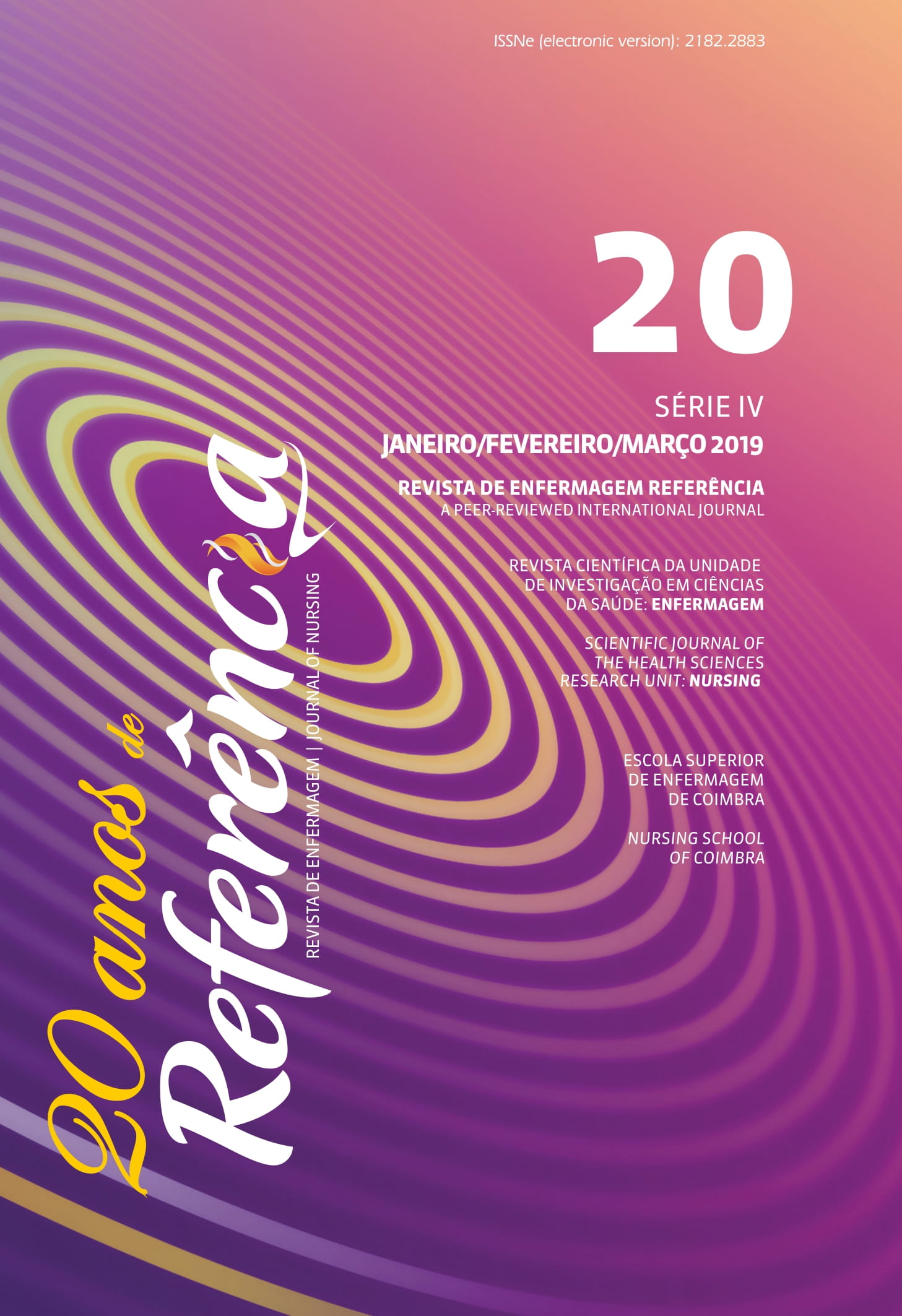Effects of a cognitive stimulation program on institutionalized older people
DOI:
https://doi.org/10.12707/RIV18043Keywords:
cognition, nursing, randomized controlled trial, aging, agedAbstract
Background: The evidence suggests that cognitive stimulation in the elderly has positive results in cognition and depressive symptomatology.
Objective: To evaluate the effectiveness of a cognitive stimulation program in cognition and depressive symptomatology in institutionalized older people.
Methodology: Experimental study in a sample of 100 elderly individuals. The Portuguese versions of the Mini-Mental State Examination and the Geriatric Depression Scale-15 were applied to each one of the groups in the pre test and post-test. The experimental group was submitted to 14 sessions of cognitive stimulation.
Results: The cognitive stimulation program improved cognition (p < 0.01), with no occurrence of statistically significant differences in the depressive symptomatology when comparing both groups (p > 0.05). From a clinical point of view, there was a reduction in depressive symptomatology (p < 0.05) in the experimental group, while the same is not true in the control group (p > 0.05).
Conclusion: The cognitive stimulation program significantly improved cognition, explaining 9.8% of identified variability. The results are encouraging, demonstrating that the program benefits institutionalized older people, thus contributing to the maintenance of their mental health.
Downloads
References
Apóstolo, J., & Cardoso, D. (2014). Estimulação cognitiva em idosos-síntese da evidência e intervenção. In L. Loureiro (Coord.), Literacia em saúde mental: Capacitar as pessoas e as comunidades para agir (pp. 157-183). Coimbra, Portugal: Escola Superior de Enfermagem de Coimbra/Unidade de Investigação em Ciências da Saúde: Enfermagem.
Apóstolo, J., Cardoso, D. F., Paúl, C., Rodrigues, M. A., & Macedo, M. S. (2016). Efectos de la estimulación cognitiva sobre las personas mayores en el âmbito comunitario. Enfermería Clínica, 26(2), 111–120. doi: 10.1016/j.enfcli.2015.07.008
Apóstolo, J., Cardoso, D. F., Rosa, A. I., & Paúl, C. (2014). The effect of cognitive stimulation on nursing home elders: A randomized controlled trial. Journal of Nursing Scholarship, 46(3), 157–166. doi: 10.1111/jnu.12072
Apóstolo, J., Cardoso, D., Marta, L., & Amaral, T. (2011). Efeito da estimulação cognitiva em idosos. Revista de Enfermagem Referência, 3(5), 193–201. doi: 10.12707/RIII11104
Apóstolo, J., Loureiro, L., Reis, I., Silva, I., Cardoso, D., & Sfectcu, R. (2014). Contribuição para a adaptação da Geriatric Depression Scale -15 para a língua portuguesa. Revista de Enfermagem Referência, 4(3), 65–73. doi: 10.12707/RIV14033
Bunce, D., Batterham, P. J., Mackinnon, A. J., & Christensen, H. (2012). Depression, anxiety and cognition in community-dwelling adults aged 70 years and over. Journal of Psychiatric Research, 46(12), 1662–1666. doi: 10.1016/j.jpsychires.2012.08.023
Chariglione, I. P., & Janczura, G. A. (2013). Contribuições de um treino cognitivo para a memória de idosos institucionalizados. Psico-USF, 18(1), 13–22. Direção-Geral da Saúde. (2017). Estratégia nacional para o envelhecimento ativo e saudável 2017-2025.
European Innovation Partnership on Active and Healthy Ageing. (2016). Action Group A3 renovated action plan 2016-2018. Recuperado de https://ec.europa.eu/eip/ageing/sites/eipaha/files/library/renovated_action_plan_2016-2018_ag_a3.pdf
Frade, J., Barbosa, P., Cardoso, S., & Nunes, C. (2015). Depression in the elderly: Symptoms in institutionalised and non-institutionalised individuals. Revista de Enfermagem Referência, 4(4), 41–49. doi: 10.12707/RIV14030
Instituto Nacional de Estatística. (2017). Projeções de população residente 2015-2080. Lisboa, Portugal: Autor.
Jean, L., Bergeron, M.-È., Thivierge, S., & Simard, M. (2010). Cognitive intervention programs for individuals with mild cognitive impairment: Systematic review of the literature. The American Journal of Geriatric Psychiatry, 18(4), 281–296. doi: 10.1097/JGP.0b013e3181c37ce9
Loureiro, L., & Gameiro, M. (2011). Interpretação crítica dos resultados estatísticos: Para lá da significância estatística. Revista de Enfermagem Referência, 3(3), 151–162. doi: 10.12707/RIII1009
Middelstadt, J., Folkerts, A. K., Blawath, S., & Kalbe, E. (2016). Cognitive stimulation for people with dementia in long-term care facilities: Baseline cognitive level predicts cognitive gains, moderated by depression. Journal of Alzheimer’s Disease, 54(1), 253–268. doi: 10.3233/JAD-160181
Morgado, J., Rocha, C. S., Maruta, C., Guerreiro, M., & Martins, I. P. (2009). New normative values of Mini-Mental State Examination. Sinapse, 9(2), 10–16.
Prince, M., Comas-Herrera, M. A., Knapp, M., Guerchet, M., & Karagiannidou, M. M. (2016). World Alzheimer Report 2016: Improving healthcare for people living with dementia: Coverage, quality and costs now and in the future. Recuperado de https://www.alz.co.uk/research/WorldAlzheimerReport2016.pdf
Rosness, T. A., Barca, M. L., & Engedal, K. (2010). Occurrence of depression and its correlates in early onset dementia patients. International Journal of Geriatric Psychiatry, 25(7), 704–711. doi: 10.1002/gps.2411
Spector, A., Thorgrimsen, L., Woods, B., Royan, L., Davies, S., Butterworth, M., & Orrell, M. (2003). Efficacy of an evidence-based cognitive stimulation therapy programme for people with dementia: Randomised controlled trial. The British Journal of Psychiatry, 183(3), 248–254. doi: 10.1192/bjp.183.3.248
Spector, A., Woods, B., & Orrell, M. (2008). Cognitive stimulation for the treatment of Alzheimer’s disease. Expert Review of Neurotherapeutics, 8(5), 751–757. doi: 10.1586/14737175.8.5.751
Woods, B., Aguirre, E., Spector, A. E., & Orrell, M. (2012). Cognitive stimulation to improve cognitive functioning in people with dementia. The Cochrane Database of Systematic Reviews, 15(2), CD005562.






















